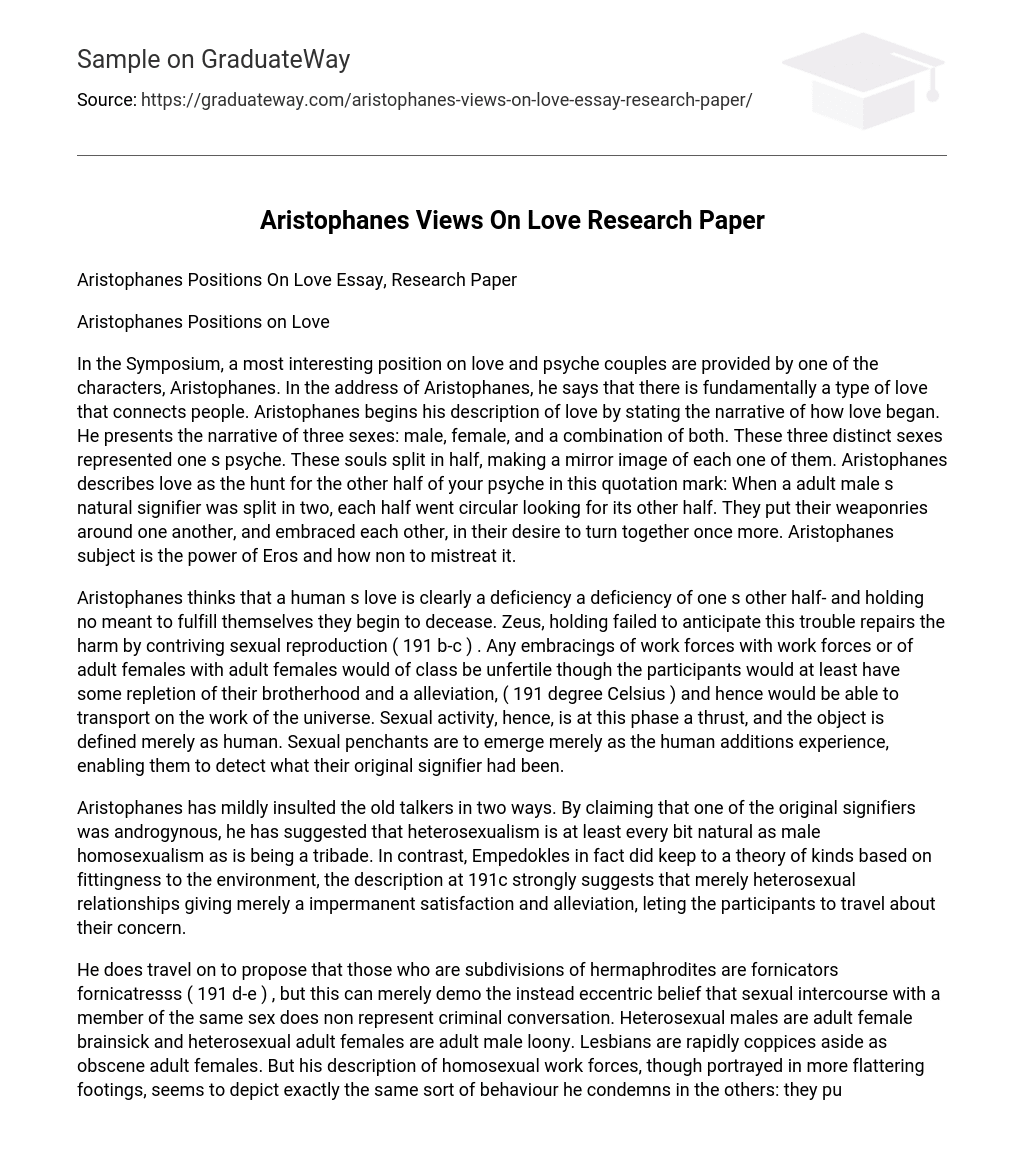Aristophanes presents his beliefs about love in his essay titled “Positions on Love”.
Aristophanes’ Views on Love
In the Symposium, Aristophanes presents an intriguing viewpoint on love and soul mates. He proposes that there exists a fundamental type of love that connects people. According to him, initially, there were three genders: male, female, and a combination of both. Each gender represented an individual’s soul. These souls were divided in half, resulting in a mirrored reflection of each person. Aristophanes characterizes love as the quest for one’s other half, stating: “When a man’s natural form was split in two, each half went round looking for its other half. They put their arms around one another and embraced each other, desiring to grow together again.” The central theme of Aristophanes’ narrative revolves around the potency of Eros and its responsible utilization.
Aristophanes believes that a person’s love is essentially a lack, specifically a lack of their other half. This deficiency causes individuals to feel unfulfilled and therefore begin to deteriorate. Zeus, realizing his failure to foresee this problem, solves it by creating sexual reproduction (191 b-c). Any same-sex relationships would, of course, be infertile, but the participants would still find some satisfaction in their companionship and relief (191 c), allowing them to continue the work of the world. At this stage, sexuality is purely a drive, with the goal being purely human. Sexual preferences only emerge as humans gain experience and discover what their original form was.
In his critique, Aristophanes has made light insults towards the elderly gossips in two ways. Firstly, he suggests that being androgynous was one of the original identities, implying that being heterosexual is just as natural as being a male homosexual or a tribade. On the other hand, Empedokles actually adhered to a theory of categorizing based on suitability to the surroundings. The description at 191c strongly implies that heterosexual relationships only provide temporary satisfaction and relief, allowing the individuals to carry on with their affairs.
He suggests that individuals belonging to subdivisions of hermaphrodites are deemed as fornicators (191 d-e), indicating that engaging in sexual activity with someone of the same sex does not constitute adultery. Heterosexual men are branded as crazy for women and heterosexual women as crazy for men. Lesbians are promptly disregarded as immoral women. However, although his portrayal of homosexual men appears more positive, it seems to depict the same behavior he condemns in others: they desire masculine partners and during their youth exhibit male characteristics by forming friendships with men and engaging in sexual activity with them (191 e-192a). As adults, they are attracted to boys and have no inclination towards marriage or having children (192a-b). Their preference is to cohabit unmarried with their partners throughout their lives (192a-b).
At this point, Aristophanes restates the previous suggestion that all three manifestations of love are natural. “Well,” he continues, “when one of them, whether he be a boy-lover…”
When a soul mate or any other kind of lover finds their unique counterpart, they are filled with overwhelming affection, intimacy, and love. They are hardly willing to be separated for even a moment. These individuals remain together throughout life, not even knowing what they would do without each other (192 b-c).
Even though sex is an important aspect of their relationship, the pleasure they find in each other’s company cannot solely rely on sex. If they had a choice, they would want to be inseparably united as a single entity for their entire life. And when they die, they hope to remain as one in the afterlife instead of two separate entities, having shared a single death (192c).
At this moment, Aristophanes’ myth presents a distinct concept of love, which has emerged in earlier speeches. Love is seen as the act of sharing one’s life, symbolized by physically turning together during sexual intimacy, reflecting the desire to merge into one entity. However, it extends beyond the physical realm to encompass the idea of a shared life, shared experiences, mutual growth, and even shared mortality.
Aristophanes reiterates that this type of love is natural because it is an attempt to return to one’s original state before being divided. The reward in such a relationship is the relationship itself, not something else that the relationship is established for. The reward is to be in line with what is natural for humans. He reminds us that the consequence for not embracing our humanity in this way is further detachment from our true human nature.
In mythology, going against Eros (193b) is portrayed as resulting in this punishment. This punishment symbolizes a separation between worlds and the gods, representing a disconnect from Eros. The gods’ greatest gift is the ability to find our true soulmates, the love that fulfills us as human beings. However, if this is the ultimate best thing, the closest alternative available to us is to find a beloved whose nature perfectly aligns with our own (193c-d).
Aristophanes stated his intention to discuss the power of Eros, highlighting that it has the ability to bring us back to a time when humanity was strong enough to challenge the Gods themselves. While Eros may grant us this power again, it is important that we do not use it. Utilizing this power could lead to conflict, causing those who do use it to lose their humanity. The key to establishing a genuine love relationship is to relinquish any desires for power or control. Once this is achieved, the true power of Eros is revealed: it has the ability to make us increasingly human.
Aristophanes began his speech by asserting that Eros provides relief to humans and heals the ailments that can only be cured by achieving ultimate happiness (189d). He concludes by making a similar medical statement that if we fulfill our duties to the Gods with reverence, they will restore our original way of life and help us attain the blessed state of bliss (193d).
33c





